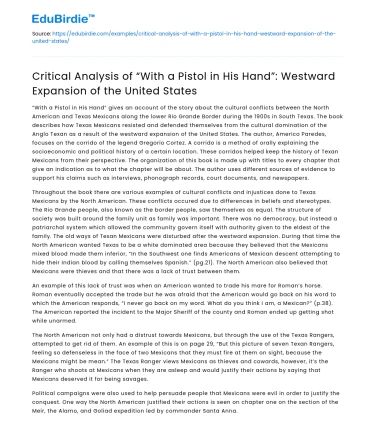“With a Pistol in His Hand” gives an account of the story about the cultural conflicts between the North American and Texas Mexicans along the lower Rio Grande Border during the 1900s in South Texas. The book describes how Texas Mexicans resisted and defended themselves from the cultural domination of the Anglo Texan as a result of the westward expansion of the United States. The author, Americo Paredes, focuses on the corrido of the legend Gregorio Cortez. A corrido is a method of orally explaining the socioeconomic and political history of a certain location. These corridos helped keep the history of Texan Mexicans from their perspective. The organization of this book is made up with titles to every chapter that give an indication as to what the chapter will be about. The author uses different sources of evidence to support his claims such as interviews, phonograph records, court documents, and newspapers.
Throughout the book there are various examples of cultural conflicts and injustices done to Texas Mexicans by the North American. These conflicts occured due to differences in beliefs and stereotypes. The Rio Grande people, also known as the border people, saw themselves as equal. The structure of society was built around the family unit as family was important. There was no democracy, but instead a patriarchal system which allowed the community govern itself with authority given to the eldest of the family. The old ways of Texan Mexicans were disturbed after the westward expansion. During that time the North American wanted Texas to be a white dominated area because they believed that the Mexicans mixed blood made them inferior, “In the Southwest one finds Americans of Mexican descent attempting to hide their Indian blood by calling themselves Spanish.” (pg.21). The North American also believed that Mexicans were thieves and that there was a lack of trust between them.
Save your time!
We can take care of your essay
- Proper editing and formatting
- Free revision, title page, and bibliography
- Flexible prices and money-back guarantee
An example of this lack of trust was when an American wanted to trade his mare for Roman’s horse. Roman eventually accepted the trade but he was afraid that the American would go back on his word to which the American responds, “I never go back on my word. What do you think I am, a Mexican?” (p.38). The American reported the incident to the Major Sheriff of the county and Roman ended up getting shot while unarmed.
The North American not only had a distrust towards Mexicans, but through the use of the Texas Rangers, attempted to get rid of them. An example of this is on page 29, “But this picture of seven Texan Rangers, feeling so defenseless in the face of two Mexicans that they must fire at them on sight, because the Mexicans might be mean.” The Texas Ranger views Mexicans as thieves and cowards, however, it’s the Ranger who shoots at Mexicans when they are asleep and would justify their actions by saying that Mexicans deserved it for being savages.
Political campaigns were also used to help persuade people that Mexicans were evil in order to justify the conquest. One way the North American justified their actions is seen on chapter one on the section of the Meir, the Alamo, and Goliad expedition led by commander Santa Anna. The commander had various Texans killed during his expedition despite the pleas from Mexicans to spare the Texan prisoners. The North American uses the expedition as an excuse to be cruel and inhumane towards innocent Mexicans. As the Texans claimed, “The Mexicans were being punished for their inhumanity to Texans at the Alamo, Meir, and Goliad” (p. 18).
The unifying theme in this book is heroism. Cortez was an ordinary man who simply defended his rights. The people of the Rio Grande all knew him by name and looked up to him as a hero as he was the embodiment of what a well-mannered person should be like. From the moment he takes flight, to the very end when he is captured, Cortez showed courage and perseverance by relentlessly evading the Texas Rangers and in the end, turning himself in to the authorities.
The most meaningful part of the book to me was when Cortez learns of all the people who are being killed because of him. The Texas Rangers murdered innocent people after they refused to tell the Rangers where Cortez was at. It really demonstrates just how much the Mexican people looked up to Cortez that they would rather sacrifice themselves in order to protect him. Not only that, but after Cortez learns this, he immediately decides to turn himself in because he didn't know of the suffering his people were going through just by helping him. To me that was very noble and a true act of heroism.
Américo Paredes has made an important contribution to the field of Latin American Literature with his novel. One can learn of the past injustices that were done to the Texas Mexicans by the North American to understand that Mexicans were not savages, they were civilized people who only defended themselves from the injustices being done to them. The story is portrayed through folklore, which allowed history to be told through the oral traditions of the Rio Grande people. This story also debunks the Anglo Texan account of history from their perspective.
This book has reaffirmed my knowledge of the mistreatment of Mexicans with Indian heritage. Even after Mexico gained independence, Anglo Mexicans argued about how to solve the issue with indians who lived in communities that were not fully integrated into the country.






 Stuck on your essay?
Stuck on your essay?

